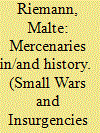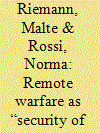| Srl | Item |
| 1 |
ID:
188313


|
|
|
|
|
| Summary/Abstract |
The history of the mercenary seems little less than the history of organized warfare itself. From the dawn of recorded history to the recent rise of Private Military Companies, mercenaries appear as a historical constant that allows scholars to make grand historical claims about the organisation of force within world history. This article cautions against this view, arguing instead that the analysis of this actor has been compromised by the failure to adequately historicise and contextualize the concept of the mercenary due to the uncritical acceptance that mercenaries are a trans-historical occurrence. Informed by a historicist contextual approach, I show how two foundational characteristics of the mercenary concept, a Westphalian understanding of ‘foreignness’ and a modern account of ‘self-interest’, were absent in the periods preceding the 18th century. I demonstrate this absence through an analysis of ‘mercenaries’ in Ancient Greece and the Middle Ages, exposing how the problematization of these actors within their own historical context displays a radical difference if compared to our contemporary understanding of the mercenary. In doing so this article raises awareness to the historical specificity of this seemingly universal concept and cautions against the uncritical backward projection of this concept into the past.
|
|
|
|
|
|
|
|
|
|
|
|
|
|
|
|
| 2 |
ID:
181632


|
|
|
|
|
| Summary/Abstract |
This article analyses remote warfare from an ontological security perspective, arguing that remote warfare needs to be understood as a response to states’ internal self-identity needs. We develop this claim by analysing an emerging aspect of remote warfare: Security Force Assistance (SFA). SFA is aimed at building up the security forces of partners, sharing best practice, assisting in security sector reform, fostering collaboration, and overall contributing to conflict resolution. Focusing on the UK, we show how and why ontological security needs are a driving force behind the UK’s SFA program. We outline the UK’s specific autobiographical narrative, which we call a “global engagement identity,” explore the crises that induced ontological insecurity, and show how the UK’s SFA program can be read as a routinised foreign policy practice aimed at taming uncertainty and reinforcing ontological security. This paper makes three contributions. First, it analyses remote warfare through an ontological security framework, thereby moving the focus from “security-as-survival” to “security-of-being.” Second, it highlights the importance of SFA as a remote warfare tool. Third, it shows the centrality of ontological security in understanding UK defence policy.
|
|
|
|
|
|
|
|
|
|
|
|
|
|
|
|